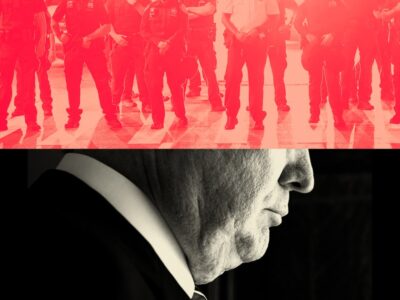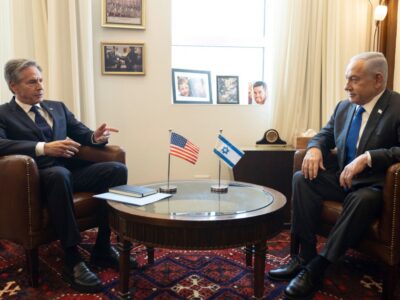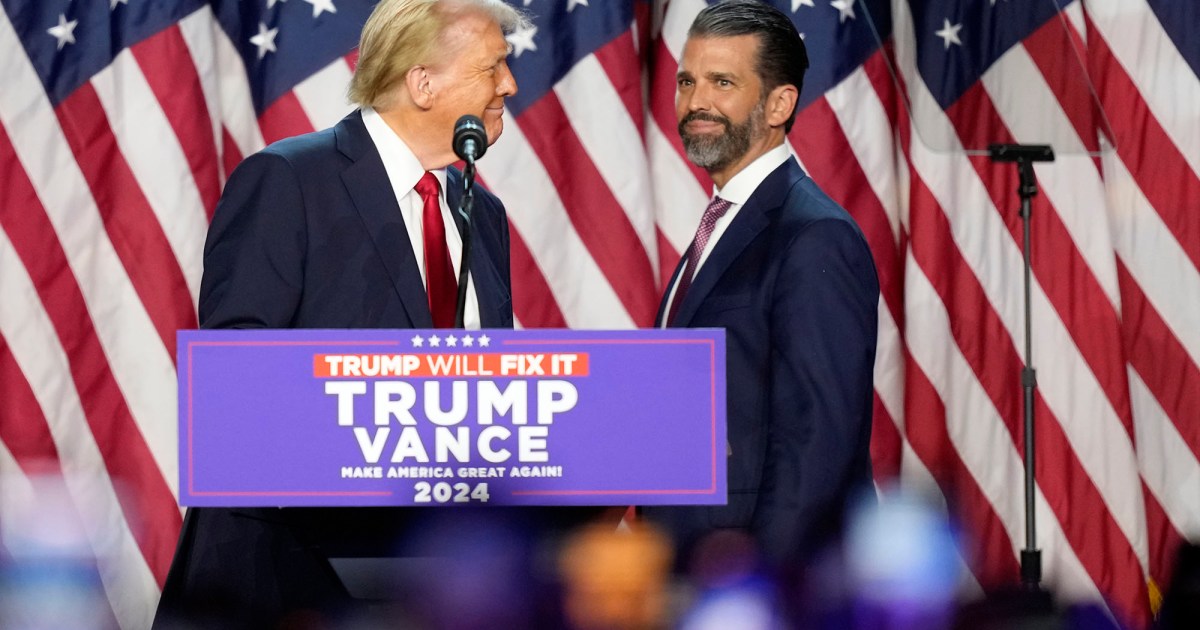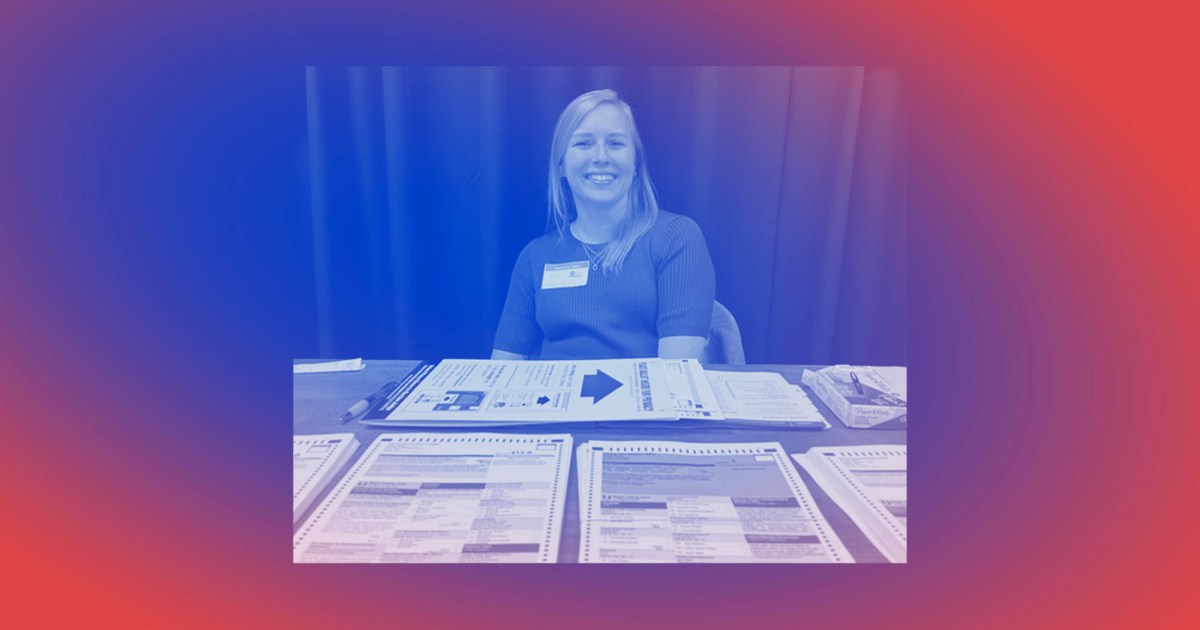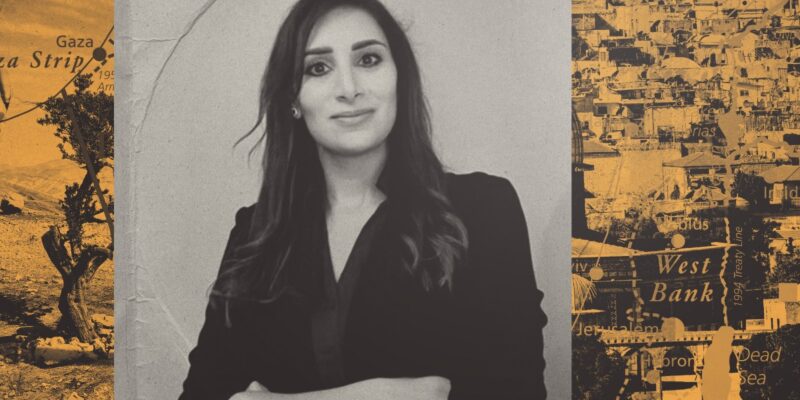
Open one social media platform and you’re hit with a fake video; open another and you’re hit with bigotry. Open a news article, and you’ll find some victims “killed” but others “dying.” Each account of events in Israel and Palestine seems to rely on different facts. What’s clear is that misinformation, hate speech, and factual distortions are running rampant.
How do we vet what we see in such a landscape? I spoke to experts across the field of media, politics, tech, and communications about information networks around Israel’s war in Gaza. This interview, with media researcher Tamara Kharroub, is the third in a five-part series that also includes computer scientist Megan Squire, journalist and news analyst Dina Ibrahim, communications and policy scholar Ayse Lokmanoglu, and Bellingcat founder Eliot Higgins.
Tamara Kharroub is the deputy director of Arab Center Washington DC, a research institute affiliated with the Qatar-based Arab Center for Research and Policy Studies. Kharroub, a researcher specializing in media and communications technology in Middle East politics, has mapped digital authoritarianism, analyzed identity and geopolitics on social platforms, and tracked media discourse around Palestine and Israel for years. Most recently, Kharroub wrote on the relationship between disinformation, hate speech, and war crime in Gaza. Social media is indispensable to coverage of the war, Kharroub says—but also where it’s hardest to “distinguish between what’s fact and what’s false.”
I spoke with Kharroub to discuss the history of bias and misinformation in media and the stakes of (mis)information in conflict.
What’s the lay of the land in media around Palestine and Israel? What do various actors contribute?
Generally, and historically, media has always been used as a tool by different actors to advance their agendas, influence public opinion, and gain support for their policies or actions. Looking specifically at what’s happening right now, in Palestine and Israel, there’s an attempt here for every actor to present themselves as the most powerful or victimized, and to get support for whatever actions they’re taking.
Israel has the upper hand here. There is no symmetry in terms of power. There’s an occupying power and an occupied population. That tends to be missing in most of the framing and reporting on what is happening. But also, this means that Israel has the leverage and the resources to have more influence on different information spaces.
Anti-Palestinian bias in mainstream media is well documented. But I think this instance, the recent events, was the most prominent in terms of anti-Palestinian bias. The attack by Hamas on Israeli civilians was just so horrific that [to some] it justifies any sort of anti-Palestinian dehumanization and racism.
What we’re seeing here is that the media is taking Israeli talking points as fact. Historically, the Israeli army has been wrong many times. There is no reason for the media to repeat talking points as facts. They’re failing to do their jobs and professions because they’re not pushing back. They’re not questioning, they’re not investigating, they’re not looking for evidence.
What’s the ideal role for media?
The media has a very important role to play: their role is to investigate, fact-check, and scrutinize government narratives and government officials.
The most important thing that the media has failed to do is question Israel on its achievement of its goals. Israel said its goal is to eliminate Hamas. But now—thousands and thousands of Palestinian civilians killed, children blown into pieces. Half of the homes in Gaza have been destroyed. And we haven’t heard anything about achieving this mission of eliminating Hamas. What’s the progress on that mission? The military spokespeople say: we’re not targeting civilians. But the evidence says otherwise. It’s the media’s responsibility to show that.
[Author’s note: Since this interview, which took place on October 24, there has been some increase in documentation and criticism of the Israeli military’s conduct in Gaza—particularly by Haaretz, Israel’s largest progressive newspaper, which recently questioned the viability of Israel’s approach.]
We are at a pivotal moment in the Palestinian-Israeli conflict, not just for Palestine and Israel, but for the region in general, and maybe for the world. Some people have called it a paradigm-shifting moment. And it is now that determines what happens next, whether we’re going to see the situation descend into a large-scale regional war or whether we’re finally going to see a push for a peace agreement that guarantees security for both Palestinians and Israelis.
Information is critical for decision-makers, whether it’s activists who are mobilizing, whether it’s people, policy decisions. The fact that information is being manipulated is very dangerous. It contributes to inciting violence, such as attacks on Palestinians or Jewish Americans. It exacerbates the conflict by inciting further anger.
If there’s a moment in modern history that the media has to be responsible and held accountable, it is now, because [its choices] affect not only what’s happening now, but what’s going to happen in the future to the people in Palestine and Israel.
Could you tell me more about media bias?
There are three categories of bias. One is terminology and framing. That includes talking about Israelis being killed, but Palestinians “died.” There’s the use of passive language when talking about Palestinian victims, as if they just dropped dead. There’s also a conflation between Hamas and ISIS, and between Palestinians and Hamas. The conflation of the language, in a way, justifies the killing of Palestinians generally; it implies that they deserved it.
This framing of hyper-securitization says, “We need to eliminate Hamas at any cost,” unconditionally, without really paying attention to the innocent civilians in Gaza, who have been under siege for 16 years and are now facing mass starvation, mass thirst, lack of access to fuel, and medical supplies. The media talks about it as the humanitarian crisis in Gaza as if it just popped up out of nowhere. People are dying, have no water, no electricity, no medicine suddenly, and we feel sorry for them, but there’s nothing we can do. That lack of contextualization is part of the bias.
Secondly, there is dehumanizing language and the double standard. We have seen the pictures, names, families, suffering, dreams, and hopes [of victims of Hamas’ October 7 attack], which is important to show. At the same time, the casting around the Palestinian victims is faceless and nameless. They’re just numbers. This implies, in a way, that they don’t matter as much. They’re not as human, or they’re not as valued, to report on, to talk, to tell their stories. There is a double standard in terms of talking about the situation.
Finally, we see media bias in the sources. We often see representatives or spokespeople of the Israeli military on CNN telling us what happened. They are not being scrutinized or questioned, or asked for evidence. At the same time, Palestinian sources and views are very, very scarce. So we hardly hear the other side of the story, the Palestinian narrative.
How does social media play into all of this?
On the positive side, social media plays an important role in providing an alternative space for expression and information. And given what we just talked about in terms of the bias in mainstream media, social media provides space for marginalized and oppressed populations to voice their stories and their opinions.
When you look at the media landscape today, most of the sources that we’re seeing on the ground in Gaza are on social media, whether it’s journalists in Gaza, or so-called influencers who are just filming [their experiences]. If it weren’t for social media, it would have been very difficult for people around the world to be aware of what is happening. Information is power. Without that information, would have believed that everything is fine. If it weren’t for social media, it would have been very difficult for people around the world to be aware of what is happening.
But there are several shortcomings on social media platforms. One is the fact that they’re also subject to existing offline power dynamics. People who have more resources and more leverage have the upper hand on social media. We’ve seen a huge number of ads on YouTube and Google and other apps that are sponsored by the Israeli government.
We’ve been seeing disinformation. Some of it is just by people who either don’t know or are very emotional, sharing whatever they see. Some is intentional disinformation and manipulation campaigns by actors and governments. There have been incidents of the Israeli military posting something and then deleting it because somebody pointed out that the timestamp doesn’t match the claim.
There is huge amount of disinformation about this on social media platforms. It’s very difficult for people to distinguish between what’s fact and what’s false. By design, social media platforms and their algorithms tend to amplify the extreme, hateful, graphic content that is mostly false or exaggerated, because those posts get the most engagement.
The last shortcoming of social media is that this enormous power of information is in the hands of a few billionaires who are not necessarily the smartest, or the best experts in terms of politics. They don’t understand the importance and scale of this type of information.
I would say that we’re still seeing people fight back against attempts to silence and censor voices. People are much more aware now, young people especially. Propaganda campaigns in the past used to be more persuasive the more aesthetically pleasing and heavily edited they were. Nowadays, the raw, unedited, genuine content is what’s considered more persuasive for young people. This changes the power dynamic: those with the most resources and leverage are in charge of the information space and the information flow.
This interview has been lightly edited and condensed for clarity.


